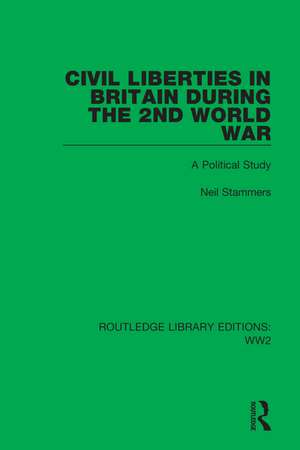Civil Liberties in Britain During the 2nd World War: A Political Study: Routledge Library Editions: WW2
Autor Neil Stammersen Limba Engleză Hardback – 22 noi 2021
| Toate formatele și edițiile | Preț | Express |
|---|---|---|
| Paperback (1) | 304.88 lei 6-8 săpt. | |
| Taylor & Francis – 15 apr 2023 | 304.88 lei 6-8 săpt. | |
| Hardback (1) | 772.95 lei 6-8 săpt. | |
| Taylor & Francis – 22 noi 2021 | 772.95 lei 6-8 săpt. |
Din seria Routledge Library Editions: WW2
-
 Preț: 246.16 lei
Preț: 246.16 lei -
 Preț: 246.68 lei
Preț: 246.68 lei -
 Preț: 223.37 lei
Preț: 223.37 lei -
 Preț: 246.79 lei
Preț: 246.79 lei -
 Preț: 246.79 lei
Preț: 246.79 lei -
 Preț: 222.12 lei
Preț: 222.12 lei - 18%
 Preț: 887.07 lei
Preț: 887.07 lei - 18%
 Preț: 773.25 lei
Preț: 773.25 lei - 18%
 Preț: 886.60 lei
Preț: 886.60 lei - 18%
 Preț: 772.34 lei
Preț: 772.34 lei - 15%
 Preț: 680.69 lei
Preț: 680.69 lei - 18%
 Preț: 873.31 lei
Preț: 873.31 lei - 18%
 Preț: 1113.89 lei
Preț: 1113.89 lei - 18%
 Preț: 873.31 lei
Preț: 873.31 lei - 18%
 Preț: 772.95 lei
Preț: 772.95 lei - 15%
 Preț: 684.69 lei
Preț: 684.69 lei - 18%
 Preț: 882.44 lei
Preț: 882.44 lei - 18%
 Preț: 774.48 lei
Preț: 774.48 lei - 18%
 Preț: 772.63 lei
Preț: 772.63 lei - 34%
 Preț: 26259.98 lei
Preț: 26259.98 lei - 18%
 Preț: 769.23 lei
Preț: 769.23 lei -
 Preț: 299.90 lei
Preț: 299.90 lei - 18%
 Preț: 882.88 lei
Preț: 882.88 lei - 15%
 Preț: 686.14 lei
Preț: 686.14 lei - 18%
 Preț: 773.25 lei
Preț: 773.25 lei - 18%
 Preț: 766.61 lei
Preț: 766.61 lei - 18%
 Preț: 882.44 lei
Preț: 882.44 lei - 18%
 Preț: 883.06 lei
Preț: 883.06 lei - 18%
 Preț: 873.31 lei
Preț: 873.31 lei - 18%
 Preț: 766.61 lei
Preț: 766.61 lei - 18%
 Preț: 769.84 lei
Preț: 769.84 lei - 18%
 Preț: 772.46 lei
Preț: 772.46 lei - 18%
 Preț: 771.86 lei
Preț: 771.86 lei - 18%
 Preț: 980.00 lei
Preț: 980.00 lei - 18%
 Preț: 886.15 lei
Preț: 886.15 lei - 18%
 Preț: 886.90 lei
Preț: 886.90 lei - 18%
 Preț: 882.41 lei
Preț: 882.41 lei - 15%
 Preț: 624.91 lei
Preț: 624.91 lei - 18%
 Preț: 873.31 lei
Preț: 873.31 lei - 18%
 Preț: 883.49 lei
Preț: 883.49 lei - 18%
 Preț: 771.55 lei
Preț: 771.55 lei - 15%
 Preț: 681.66 lei
Preț: 681.66 lei
Preț: 772.95 lei
Preț vechi: 942.62 lei
-18% Nou
Puncte Express: 1159
Preț estimativ în valută:
147.95€ • 155.31$ • 122.22£
147.95€ • 155.31$ • 122.22£
Carte tipărită la comandă
Livrare economică 30 ianuarie-13 februarie 25
Preluare comenzi: 021 569.72.76
Specificații
ISBN-13: 9781032078007
ISBN-10: 1032078006
Pagini: 260
Dimensiuni: 156 x 234 x 16 mm
Greutate: 0.64 kg
Ediția:1
Editura: Taylor & Francis
Colecția Routledge
Seria Routledge Library Editions: WW2
Locul publicării:Oxford, United Kingdom
ISBN-10: 1032078006
Pagini: 260
Dimensiuni: 156 x 234 x 16 mm
Greutate: 0.64 kg
Ediția:1
Editura: Taylor & Francis
Colecția Routledge
Seria Routledge Library Editions: WW2
Locul publicării:Oxford, United Kingdom
Cuprins
1. The Nature of Emergency Powers and the Limitations of Parliamentary Control 1.1. The Development of Emergency Legislation 1.2. The Emergency Powers (Defence) Act 1939 and the First Defence Regulations 1.3. Opposition to the Defence Regulations and their Amendment 1939 1.4. The Military Crisis and New Powers 1.5. The Resistance to Change 1.6. Commentary 2. The Internment of Enemy Aliens 2.1. Pre-War Planning and the Aliens’ Tribunals 2.2. The Policy of General Internment 2.3. Conditions Chaos and Deportations 2.4. The Growth of Opposition and the Government Response 2.5. Commentary 3. The Debates Over Regulation 18B 3.1. Regulation 18B and its Use 3.2. The Development of United Opposition 3.3. The Disintegration of United Opposition 3.4. Commentary 4. The Control of Political Action 4.1. The Chamberlain Government and Anti-War Propaganda 4.2. The Coalition Government and the Invasion Crisis 4.3. The Communist Party in the Blitz 4.4. Unwelcome Allies 4.5. Towards D-Day and Peace 4.6. Commentary 5. Censorship and the Media 5.1. Postal and Telegraphic Censorship 5.2. The National Press 5.3. The BBC 5.4. Commentary 6. Mobilisation for the Total War Economy 6.1. Early Concepts of Manpower Policy and the Need for Consensus 6.2. The Machinery of Compulsion 6.3. The Application of Controls in General 6.4. Degrees of Coercion – Pressure, Directions and Prosecutions 6.5. Commentary 7. Civil Liberties in Industry 7.1. Industrial Appeasement to the Establishment of Tripartism 7.2. The industrial Imperative 7.3. The Rise of Industrial Unrest 7.4. Commentary 8. Historical Postscript – the End of the War 9. Conclusions 9.1. Government Practice and Civil Liberties 9.2. Democracy and Crisis Government
Descriere
This book, first published in 1983, is a detailed study of government policy towards civil liberties in Britain during the Second World War, the nature of crisis government and its implications for democracy.
